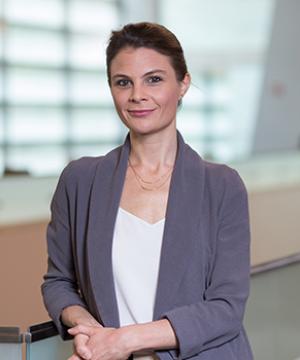Maeve Glass ’09 on the Careers in Law Teaching Program
Associate Professor of Law, Columbia Law School
Columbia Law School’s Careers in Law Teaching Program (CILTP) has a long history of preparing students and alumni for jobs in academia. CILTP provides comprehensive guidance, including one-on-one mentorship, job-talk training, moot interviews, and preparation for the annual Association of American Law Schools Faculty Recruitment Conference in Washington. We talked with six alumni whose experiences with the program helped guide them toward faculty positions at law schools across the country.
Maeve Glass is a legal historian of the United States who examines the development of constitutional law and its implications today. She teaches Property, as well as courses on the legal history of American slavery and constitutional history. After receiving her J.D. from Columbia, Glass earned a Ph.D. from Princeton University, and she is currently completing her first book, These United States: The Fracturing of America, which explores how the United States became a nation of co-equal states. Before her appointment to the faculty in 2018, Glass was an academic fellow at the Law School. She has also held fellowships in legal history at Harvard Law School and New York University School of Law. Glass has received awards from the American Society for Legal History for her work on the history of state citizenship as well as from the National Institute of Military Justice for her work on the history of military commissions.
How did the CILTP prepare you for your academic career? What type of support was most critical for you?
The program provided me, as an alumna and an academic fellow, with an extraordinary opportunity to be immersed in the intellectual life of the school. From the earliest days of the program, I had the opportunity to participate in the vibrant exchange of ideas that defines the faculty here, whether hearing my present colleagues share their scholarship during the weekly Faculty Lunch Workshops or workshopping my own research through formal presentations and informal conversations.
What advice do you have for current J.D. students or recent graduates who are considering academic careers?
Keep an ideas/questions notebook. I have found this to be an invaluable resource for reflecting on and processing connections across the fields of law.
What is the best thing about teaching?
Having the opportunity to see the next generation of lawyers and leaders at work, transforming material from a casebook into powerful new arguments, ideas, and questions that need answering.
# # #
Published on March 21, 2019
